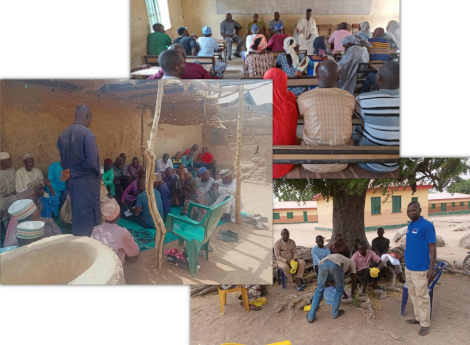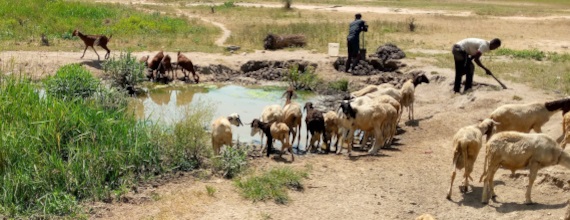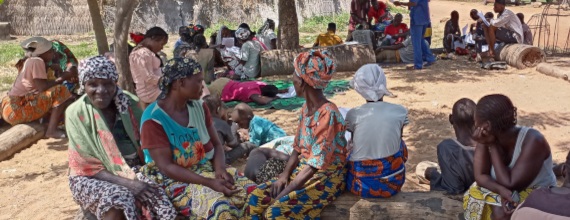✖
Our Reach, Scope, and Community Engagement
Our organization operates across diverse and climate-sensitive regions, fostering participatory research and field engagement focused on natural resource management, climate resilience, and conflict transformation. With active presence in several localities across two states, we work directly with farmers, herders, youth, and women—using surveys, seasonal calendars, environmental diagnostics, and focused group dialogues—to co-develop insights and interventions that are grounded in community realities.
Our engagement strategy is deeply integrated and multidisciplinary. We combine tools for tracking climate impacts with participatory water source mapping, cropping system analysis, and livestock resource management. From developing grazing calendars to highlighting gender-based vulnerability indicators, our work informs practical solutions that are responsive to seasonal variability and social dynamics. Our presence supports communities in adapting through context-driven water provisioning, equitable access strategies, and cooperative land-use systems that enhance harmony and food security.
Administratively, we maintain structured, inclusive mechanisms that amplify community voice while informing policy. Our datasets are sex- and age-disaggregated, revealing nuanced social roles—such as women’s participation in peace advocacy and youth’s influence in behavioral change. We engage stakeholders across formal and informal systems, contributing to conflict mediation efforts, governance frameworks, and environmental justice. Our work bridges grassroots realities with regional development planning, helping to ensure that solutions are not only practical but also sustainable and socially just.
✖
Seasonal Patterns and Trends in Farmer-Herder Relationship and Climate Change Influence
Farmers and herders in Nigeria have historically coexisted through mutual support, but the past decade has seen increased tensions and violent clashes. These arise from disputes over resources, such as crop damage, livestock theft, and water pollution. This study evaluates how local communities understand the impact of climate change on land and water and seeks to support peaceful implementation of the National Livestock Transformation Plan (NLTP) by identifying growing seasons. The study was conducted across ten COMITAS project communities in Adamawa State, including Ndikong, Gengle, Tambo, and others.
Findings reveal that about 80% of respondents are farmers, with over 65% having basic education. A majority were male (60%) and below 40 years (55%). Over 80% reported conflicts related to water, with 37% attributing them to herder activities. Boreholes and rivers make up 80% of water sources, while dams contribute just 2%, suggesting a need for investment in dam infrastructure to reduce conflicts. Most farmers practice rain-fed, multi-cropping systems, and many are unaware of grazing routes near their lands. Extended harvest periods, caused by multiple crop varieties and unpredictable rainfall patterns, were major conflict triggers.
Locals interpret climate change primarily as irregular rainfall patterns affecting planting and harvesting, including shifts in onset, length of growing season, and dry spells. Other indicators include floods, droughts, deforestation, and pest outbreaks. The study recommends simplifying crop selection to 1–2 varieties per locality to avoid trial-and-error farming and better align agricultural practices with climate realities, thus promoting peace and productivity in farming communities.
✖
Impact of Climate Change on Competition for Natural Resources
Cross-border Conflicts and Social Justice in Adamawa and Taraba States, Nigeria
Climate change is a major global challenge with severe impacts, especially in Sub-Saharan Africa due to its reliance on rain-fed agriculture and limited adaptation capacity. In Nigeria, climate shifts such as altered rainfall, droughts, and shrinking water bodies like Lake Chad have increased farmer-herder conflicts as herders move southward in search of resources. This study investigates how climate change is driving natural resource competition in Adamawa and Taraba States, seeking strategies to promote peace, justice, and sustainability.
The research covered 97% of its target sample, with most respondents being males aged 26–55 years and holding secondary school-level education. Over 90% had lived in their communities for more than a decade. Locals recognized climate change through extreme weather patterns including drought, floods, and pest outbreaks, which often result in loss of crops and livestock. Irrigated farming is the primary alternative after such events but is feasible only near accessible water sources—these areas also attract herders during dry seasons, sparking competition and conflict.
Boreholes and wells are the most common water sources (63%), followed by rivers and streams (32.5%), which are mostly seasonal. Dams and ponds serve only 4.5% of respondents. Communities like Abbare B, Monkin, Gorobi, Gengle, Bille, and Kpasham face the highest risk of dry-season water scarcity. Water harvesting during rainy seasons is suggested to ease this pressure. Adopting IPCC (2020) recommendations could help resolve these cross-border tensions and support long-term resource sharing and environmental justice.



